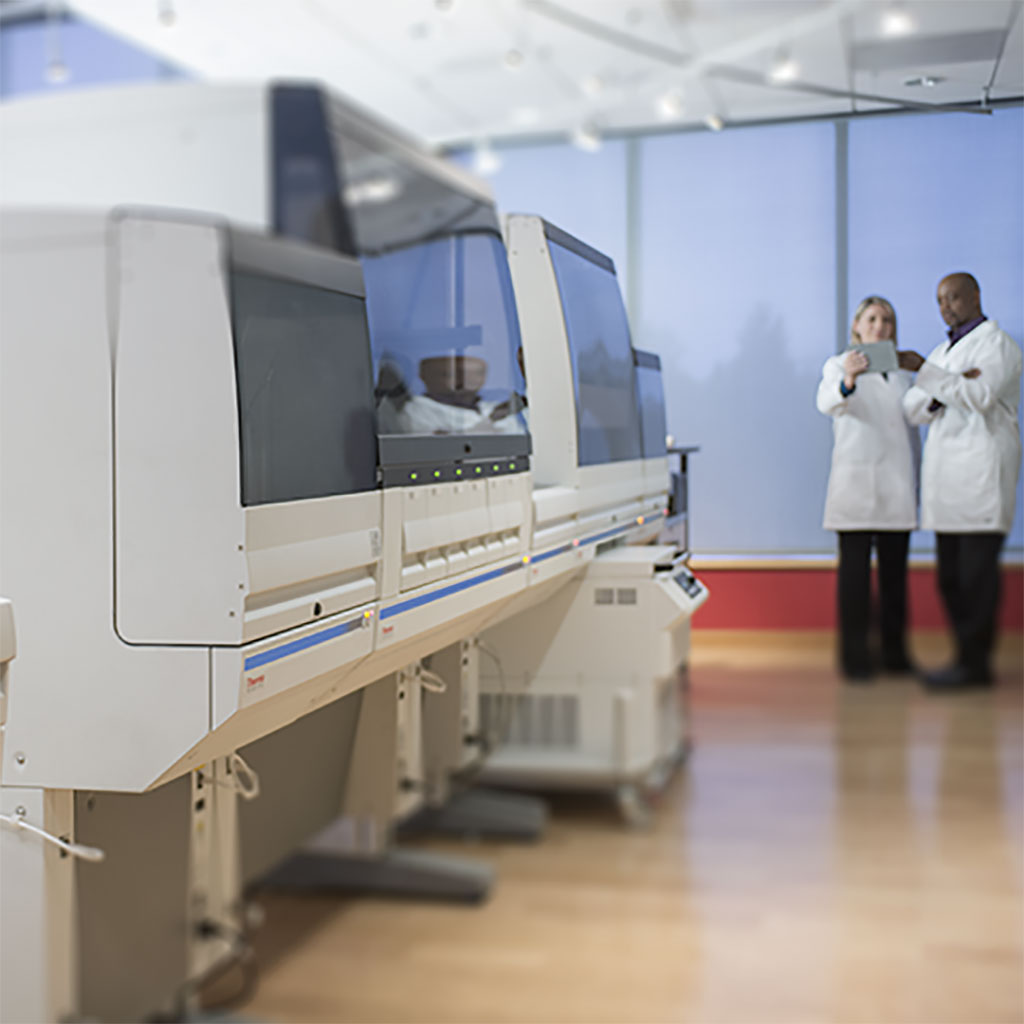Ortho Exhibits VITROS Range of Diagnostic Testing and Automation Solutions at MEDLAB Middle East 2021
|
By LabMedica International staff writers Posted on 24 Jun 2021 |

Image: VITROS® Automation Solutions (Photo courtesy of Ortho Clinical Diagnostics)
Ortho Clinical Diagnostics (Raritan, NJ, USA) exhibited its wide range of VITROS diagnostic testing and automation solutions at MEDLAB Middle East 2021.
Ortho’s VITROS Automation Solutions presented at the event are open, flexible and scalable solutions. Versatile, effective, and reliable, VITROS Automation Solutions combined with VITROS Chemistry and Immunodiagnostic Systems delivers high-quality results, faster than VITROS Systems alone. Ortho VITROS Systems makes labs powerfully efficient with minimal training time, six-month calibration, and a 96.5% first pass yield that erases the need for repeat testing. While non-VITROS systems use large, costly amounts of purified water, one VITROS System saves 160,000 liters of water per year. Ortho showcased the VITROS XT Systems that embrace DIGITAL CHEMISTRY™ and are powered by a new digital reflectometer, connecting lab ecosystems better than ever before, driving efficiency, productivity and improving the quality of care provided to patients.
Ortho also highlighted its COVID-19 testing solutions at the event, including the VITROS antibody assays for COVID-19. This included VITROS Anti-SARS-COV-2 Total test which qualitatively measures total (ALL) antibodies to the SARS-CoV-2 virus (IgG, IgM, IgA and other isotypes) and therefore has the widest clinical utility to measure immune response. This antibody test can be used to aid in the diagnosis of acute or past infection in conjunction with other laboratory tests and or clinical information. In addition, this test may be used in population surveillance for viral exposure. Similarly, the VITROS Anti-SARS-COV-2 IgG test qualitatively measures IgG Antibodies to the SARS-CoV-2 virus. This antibody test has long-term applicability in identifying patients with an adaptive immune response, indicating recent or prior infection. In addition, this test may be used in population surveillance for viral exposure. In addition Ortho showcased the VITROS SARS-CoV-2 Antigen Test that produces accurate, clinically reliable results on its high-volume VITROS Systems. These analyzers normally run a broad menu of over 150 different tests from blood and body fluid samples, but now are also able to run samples derived from swabs.
Related Links:
Ortho Clinical Diagnostics
Ortho’s VITROS Automation Solutions presented at the event are open, flexible and scalable solutions. Versatile, effective, and reliable, VITROS Automation Solutions combined with VITROS Chemistry and Immunodiagnostic Systems delivers high-quality results, faster than VITROS Systems alone. Ortho VITROS Systems makes labs powerfully efficient with minimal training time, six-month calibration, and a 96.5% first pass yield that erases the need for repeat testing. While non-VITROS systems use large, costly amounts of purified water, one VITROS System saves 160,000 liters of water per year. Ortho showcased the VITROS XT Systems that embrace DIGITAL CHEMISTRY™ and are powered by a new digital reflectometer, connecting lab ecosystems better than ever before, driving efficiency, productivity and improving the quality of care provided to patients.
Ortho also highlighted its COVID-19 testing solutions at the event, including the VITROS antibody assays for COVID-19. This included VITROS Anti-SARS-COV-2 Total test which qualitatively measures total (ALL) antibodies to the SARS-CoV-2 virus (IgG, IgM, IgA and other isotypes) and therefore has the widest clinical utility to measure immune response. This antibody test can be used to aid in the diagnosis of acute or past infection in conjunction with other laboratory tests and or clinical information. In addition, this test may be used in population surveillance for viral exposure. Similarly, the VITROS Anti-SARS-COV-2 IgG test qualitatively measures IgG Antibodies to the SARS-CoV-2 virus. This antibody test has long-term applicability in identifying patients with an adaptive immune response, indicating recent or prior infection. In addition, this test may be used in population surveillance for viral exposure. In addition Ortho showcased the VITROS SARS-CoV-2 Antigen Test that produces accurate, clinically reliable results on its high-volume VITROS Systems. These analyzers normally run a broad menu of over 150 different tests from blood and body fluid samples, but now are also able to run samples derived from swabs.
Related Links:
Ortho Clinical Diagnostics
Latest MEDLAB 2021 News
- MP Biomedicals Exhibits Diagnostics Kits and Sample Prep Solutions at MEDLAB Middle East 2021
- BD Demonstrates Latest Medtech Innovations at MEDLAB Middle East 2021
- Diagnostica Stago Highlights Max Generation Family of Coagulation Analyzers at MEDLAB Middle East 2021
- Randox Showcases Latest Product Portfolio and Services at MEDLAB Middle East 2021
- Horiba Medical Exhibits New Generation of Automated Hematology Analyzers at MEDLAB Middle East 2021
- Rad Source Technologies Introduces Premier X-Ray Blood Irradiator RS 3400 at MEDLAB Middle East 2021
- Nova Biomedical Showcases Advanced Point-of-Care Capillary Blood Analyzers at MEDLAB Middle East 2021
- Erba Mannheim Showcases Exciting New Introductions at MEDLAB Middle East 2021
- Bioperfectus Presents Advanced Infectious Disease Diagnostic Solutions at MEDLAB Middle East 2021
- PerkinElmer Demonstrates High-Throughput MSMS Dried Blood Spot Screening Solutions at Medlab Middle East 2021
- PerkinElmer’s EUROIMMUN Presents Novel Ultrafast Automated Microscope and Intelligent Software for State-of-the-Art Diagnostics
- LumiraDx Highlights Next-Generation Point of Care Solutions at MEDLAB Middle East Virtual Event
- Quidel Showcases Comprehensive Suite of COVID-19 Testing Solutions at MEDLAB Middle East 2021
- MEDLAB Middle East 2021 Brings World of Laboratory Medicine Together Under ‘United by Business’ Show Theme
Channels
Clinical Chemistry
view channel
Simple Blood Test Offers New Path to Alzheimer’s Assessment in Primary Care
Timely evaluation of cognitive symptoms in primary care is often limited by restricted access to specialized diagnostics and invasive confirmatory procedures. Clinicians need accessible tools to determine... Read more
Existing Hospital Analyzers Can Identify Fake Liquid Medical Products
Counterfeit and substandard medicines remain a serious global health threat, with World Health Organization estimates suggesting that 10.5% of medicines in low- and middle-income countries are either fake... Read moreMolecular Diagnostics
view channel
Changes In Lymphatic Vessels Can Aid Early Identification of Aggressive Oral Cancer
Oral cancers are the most common malignant tumors in the head and neck region and cause more than 188,000 deaths worldwide each year. Unlike many other cancers, even small, early-stage oral tumors can... Read more
Molecular Monitoring Approach Helps Bladder Cancer Patients Avoid Surgery
Muscle-invasive bladder cancer is typically treated with chemotherapy followed by radical cystectomy, the complete removal of the bladder. While often effective, the surgery significantly affects quality... Read more
Genetic Tests to Speed Diagnosis of Lymphatic Disorders
Defects in the lymphatic system affect approximately one in every 3,500 newborns and can lead to severe complications, including organ failure, breathing difficulties, and life-threatening infections.... Read more
New Extraction Kit Enables Consistent, Scalable cfDNA Isolation from Multiple Biofluids
Circulating cell-free DNA (cfDNA) found in plasma, serum, urine, and cerebrospinal fluid is typically present at low concentrations and is often highly fragmented, making efficient recovery challenging... Read moreHematology
view channel
Rapid Cartridge-Based Test Aims to Expand Access to Hemoglobin Disorder Diagnosis
Sickle cell disease and beta thalassemia are hemoglobin disorders that often require referral to specialized laboratories for definitive diagnosis, delaying results for patients and clinicians.... Read more
New Guidelines Aim to Improve AL Amyloidosis Diagnosis
Light chain (AL) amyloidosis is a rare, life-threatening bone marrow disorder in which abnormal amyloid proteins accumulate in organs. Approximately 3,260 people in the United States are diagnosed... Read moreImmunology
view channel
New Biomarker Predicts Chemotherapy Response in Triple-Negative Breast Cancer
Triple-negative breast cancer is an aggressive form of breast cancer in which patients often show widely varying responses to chemotherapy. Predicting who will benefit from treatment remains challenging,... Read moreBlood Test Identifies Lung Cancer Patients Who Can Benefit from Immunotherapy Drug
Small cell lung cancer (SCLC) is an aggressive disease with limited treatment options, and even newly approved immunotherapies do not benefit all patients. While immunotherapy can extend survival for some,... Read more
Whole-Genome Sequencing Approach Identifies Cancer Patients Benefitting From PARP-Inhibitor Treatment
Targeted cancer therapies such as PARP inhibitors can be highly effective, but only for patients whose tumors carry specific DNA repair defects. Identifying these patients accurately remains challenging,... Read more
Ultrasensitive Liquid Biopsy Demonstrates Efficacy in Predicting Immunotherapy Response
Immunotherapy has transformed cancer treatment, but only a small proportion of patients experience lasting benefit, with response rates often remaining between 10% and 20%. Clinicians currently lack reliable... Read moreMicrobiology
view channel
Three-Test Panel Launched for Detection of Liver Fluke Infections
Parasitic liver fluke infections remain endemic in parts of Asia, where transmission commonly occurs through consumption of raw freshwater fish or aquatic plants. Chronic infection is a well-established... Read more
Rapid Test Promises Faster Answers for Drug-Resistant Infections
Drug-resistant pathogens continue to pose a growing threat in healthcare facilities, where delayed detection can impede outbreak control and increase mortality. Candida auris is notoriously difficult to... Read more
CRISPR-Based Technology Neutralizes Antibiotic-Resistant Bacteria
Antibiotic resistance has accelerated into a global health crisis, with projections estimating more than 10 million deaths per year by 2050 as drug-resistant “superbugs” continue to spread.... Read more
Comprehensive Review Identifies Gut Microbiome Signatures Associated With Alzheimer’s Disease
Alzheimer’s disease affects approximately 6.7 million people in the United States and nearly 50 million worldwide, yet early cognitive decline remains difficult to characterize. Increasing evidence suggests... Read morePathology
view channel
Single Sample Classifier Predicts Cancer-Associated Fibroblast Subtypes in Patient Samples
Pancreatic ductal adenocarcinoma (PDAC) remains one of the deadliest cancers, in part because of its dense tumor microenvironment that influences how tumors grow and respond to treatment.... Read more
New AI-Driven Platform Standardizes Tuberculosis Smear Microscopy Workflow
Sputum smear microscopy remains central to tuberculosis treatment monitoring and follow-up, particularly in high‑burden settings where serial testing is routine. Yet consistent, repeatable bacillary assessment... Read more
AI Tool Uses Blood Biomarkers to Predict Transplant Complications Before Symptoms Appear
Stem cell and bone marrow transplants can be lifesaving, but serious complications may arise months after patients leave the hospital. One of the most dangerous is chronic graft-versus-host disease, in... Read moreTechnology
view channel
Blood Test “Clocks” Predict Start of Alzheimer’s Symptoms
More than 7 million Americans live with Alzheimer’s disease, and related health and long-term care costs are projected to reach nearly USD 400 billion in 2025. The disease has no cure, and symptoms often... Read more
AI-Powered Biomarker Predicts Liver Cancer Risk
Liver cancer, or hepatocellular carcinoma, causes more than 800,000 deaths worldwide each year and often goes undetected until late stages. Even after treatment, recurrence rates reach 70% to 80%, contributing... Read more
Robotic Technology Unveiled for Automated Diagnostic Blood Draws
Routine diagnostic blood collection is a high‑volume task that can strain staffing and introduce human‑dependent variability, with downstream implications for sample quality and patient experience.... Read more
ADLM Launches First-of-Its-Kind Data Science Program for Laboratory Medicine Professionals
Clinical laboratories generate billions of test results each year, creating a treasure trove of data with the potential to support more personalized testing, improve operational efficiency, and enhance patient care.... Read moreIndustry
view channel
QuidelOrtho Collaborates with Lifotronic to Expand Global Immunoassay Portfolio
QuidelOrtho (San Diego, CA, USA) has entered a long-term strategic supply agreement with Lifotronic Technology (Shenzhen, China) to expand its global immunoassay portfolio and accelerate customer access... Read more

















